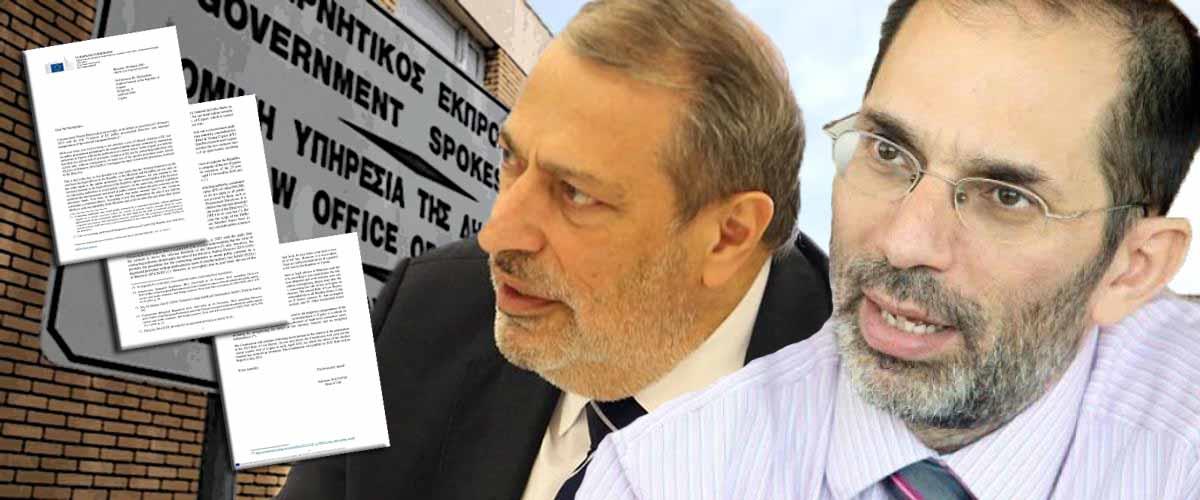Εκ διαμέτρου αντίθετες είναι οι θέσεις Γενικού Ελεγκτή και Γενικού Εισαγγελέα, σε σχέση με την απάντηση της Ευρωπαϊκής Επιτροπής, στις καταγγελίες του Οδυσσέα Μιχαηλίδη, στον απόηχο της απόφασης του Γιώργου Σαββίδη να χαρακτηρίσει ως νόμιμες δύο συμβάσεις με το Υπουργείο Οικονομικών, τις οποίες ο Ελεγκτής έδειξε πως πρόκειται για παράνομες πράξεις, αφού έπρεπε να είχε προηγηθεί δημόσιος διαγωνισμός.
Ο Οδυσσέας Μιχαηλίδης, ένιωσε δικαιωμένος από την απάντηση της Ευρωπαϊκής Επιτροπής, αναφέροντας πως συμφώνησε μαζί του πως πρόκειται για παράνομη πράξη και πως η Κομισιόν υπέδειξε ότι εκ των υστέρων και/ή εκ των προτέρων γνωμάτευση του Γενικού Εισαγγελέα ότι η απευθείας ανάθεση στις δύο πάνω συμβάσεων ήταν νόμιμη, ήταν εσφαλμένη.
ΔΙΑΒΑΣΤΕ ΕΔΩ: Σφάλμα Εισαγγελέα δείχνει η Ευρωπαϊκή Επιτροπή, δικαιώνει Ελεγκτή που έδειξε παρανομία
Στην αντίπερα όχθη, ο Γενικός Εισαγγελέας, έκανε λόγο για διαστρέβλωση και παραποίηση της απάντησης, ενώ εμφανίστηκε και ο ίδιος δικαιωμένος, λέγοντας πως η Ευρωπαϊκή Επιτροπή, επιβεβαιώνει «πλήρως η ορθότητα της νομικής βάσης, των αρχών και της νομολογίας στις οποίες εδράζεται η γνωμάτευση του Γενικού Εισαγγελέα της Δημοκρατίας». Παράλληλα, ο Γιώργος Σαββίδης, ανέφερε πως, «θεωρώ το περιστατικό αυτό ως ακόμα μια απαράδεκτη εκτροπή του ρόλου και των εξουσιών του Γενικού Ελεγκτή, ο οποίος, για ακόμη μία φορά, προφασιζόμενος ανυπόστατες και κατ’ ισχυρισμό παρανομίες, κατήγγειλε τη χώρα μας στους ευρωπαϊκούς θεσμούς».
ΔΙΑΒΑΣΤΕ ΕΔΩ: Άλλη ανάγνωση της απάντησης της Κομισιόν δίνει ο Εισαγγελέας, εκνευρισμένος με Οδυσσέα
Δημοσίευσε την απάντηση ο Ελεγκτής
Άμεση ήταν η απάντηση του Οδυσσέα Μιχαηλίδη στον Γενικό Εισαγγελέα, ο οποίος προέβη σε δημοσιοποίηση της τετρασέλιδης απάντησης της Ευρωπαϊκής Επιτροπής, γράφοντας πως: Με έκπληξη διαπιστώνουμε ότι η ΝΥ, σε παραπλανητική ανακοίνωση, αντί να παραδεχθεί ότι η γνωμάτευσή της ήταν πρόδηλα εσφαλμένη αφού συγκρούεται με όλες τις αρχές που παραθέτει η ΕΕ στην επιστολή της, εμφανίζεται και δικαιωμένη. Η επιστολή αυτούσια προς διάψευση των ισχυρισμών της.
Επιπρόσθετα, ο Οδυσσέας Μιχαηλίδης ανέφερε πως: Η ΕΕ εξήγησε ότι αν επείγεσαι υπάρχουν συντετμημένες ανοικτές διαδικασίες, και αν ούτε με αυτές προλαβαίνεις δεν πας μόνο σε μία εταιρεία αλλά σε περισσότερες. Το ΥΟ, χωρίς να είναι καν επείγον, παράνομα πήγε απευθείας σε μία, η ΝΥ τους κάλυψε και κάνουν πως δεν αντιλαμβάνονται.
Αυτούσιες οι επιστολές (σ.σ μεταφρασμένες):
Dear Mr Michaelides,
Commissioner Thierry Breton asked me to reply, on his behalf, to your letter of 1 February 2023 with the title “Violation of EU public procurement Directive and improper interpretation of the relevant European Directive”. With your letter, you wish to bring to our attention a case of alleged violation of EU law on public procurement pertaining to the award of public services contracts by contracting authorities in Cyprus without the publication of contract notice. In this regard, you indicate that there is a serious risk of systematic violation of EU law by contracting authorities who will be able, without consequences, to make use of the specific procedure under Article 32(2)(c) of Directive 2014/24/EU to bypass the open or restricted procedures, foreseen in the Directive. This is due to the fact, as you describe it in your letter, that the Attorney General is on the one hand, the legal advisor to the Republic, to the Ministers and the public service, and, on the other hand, is the public prosecutor for criminal offences. As you explain it, the Attorney General, as the legal advisor of the Republic, opines on the legality of the decision of contracting authorities to award public contracts. At the same time, national legislation prohibits the announcement and award of public tenders without the prior assurance of the necessary funds. You note, in this regard, that under national law, this violation constitutes a criminal offence. According to you, this undermines the rule of law and the ability to seek accountability from Ministers and civil servants who can abuse their power and commit wrongdoing without consequence if the Attorney General provides them, as legal adviser, with ex ante or ex post cover.
Hence, you ask for our intervention towards the competent public procurement authority in the Republic of Cyprus, which is tasked with monitoring the implementation of the public procurement rules. According to the information you provide, your Office carried out a procurement audit where you found that the Ministry of Finance as the contracting authority concluded two contracts, the first on 18 November 2021 with the audit firm Ernst & Young Cyprus (EY) worth €95,200 and the second on 14 July 2022 with the audit firm PricewaterhouseCoopers (PwC) of value €191,238. During this audit control, you found that the two contracts had been concluded via direct award, without the announcement of an open tender, invoking the provision of Article 32(2)(c) of Directive 2014/24/EU. The two contracts concerned the provision of consulting services to support the Republic of Cyprus in negotiations it is conducting with the concession company of the two Cypriot airports, Hermes Airports Ltd (“Hermes”), for the possible extension of the 25-year agreement expiring on 11 May 2031, for further 5.5 years i.e. until 11 November 2036 and the settlement of disputes that have arisen between the parties.
Regarding the contract that the Ministry of Finance, as the contracting authority, concluded on 18 November 2021 with the audit firm Ernst & Young Cyprus (EY) of value €95,200, we would like to note that the Public Procurement Directives do not apply to all public contracts. There remains a wide range of contracts that are not covered by them, such as contracts below the thresholds for application of the Public Procurement Directives. It is our understanding that the value of the contract in question is below the relevant threshold of Directive 2014/24/EU and, therefore, it would fall outside the scope of the Directive. However, as confirmed by the European Court of Justice (CJEU) in its case-law, the fundamental rules of the Treaty apply also to contracts outside the scope of the Public Procurement Directives. Hence, contracting authorities from Member States have to comply with the rules and principles of the Treaty whenever they conclude public contracts falling into the scope of that Treaty. In relation to the contract that was concluded on 14 July 2022 with the audit firm PricewaterhouseCoopers (PwC) worth €191,238, it is our understanding that the value of the contract is above the relevant threshold of the Directive and, therefore, the contracting authority should apply the rules of the Directive. Indeed, Directive 2014/24/EU provides the possibility for the contracting authorities to award public contracts by a negotiated procedure without publication in cases of extreme urgency (see Article 32(2)(c) of Directive 2014/24/EU).
However, as you rightly state in your letter, the use of this procedure remains exceptional, as contracting authorities derogate in this case from the basic principle of the Treaty concerning transparency. All the conditions have to be met cumulatively and are to be interpreted restrictively. A ‘negotiated procedure without publication’ allows contracting authorities to negotiate directly with potential contractors; a direct award to a preselected economic operator remains the exception, applicable if only one undertaking is able to deliver within the technical and time constraints imposed by the extreme urgency. It should be further noted that each contracting authority has to evaluate whether the conditions for using such a ‘negotiated procedure without prior publication’ are met. It has to justify its choice of such a procedure in an individual report.
Whether it is impossible to respect even the very short deadlines of the accelerated open (15 days) or restricted procedure (10 days), it will have to be assessed on a case-by-case basis. We understand that the Treasury of the Republic of Cyprus, which is the competent Authority on Public Procurement, where it identifies by its own initiative or upon the receipt of information specific violations or systemic problems, it has the power to indicate those problems to the contracting authority. In case of no conformity by the contracting authority, the Treasury of the Republic of Cyprus has, among others, the right, if it considers it appropriate, to refer specific breaches of Article 29, to the Tenders Review Authority for adoption of a decision and/or interim measures, when the interested parties, or other persons and entities did not have access to the review procedures under the Public Procurement Procedures Review Law.
We would like to note that the Member States have the primary responsibility for transposing, applying and implementing EU law correctly. This means that, where citizens' rights under EU law are affected at national level, the public have to be granted access to rapid and effective national redress mechanisms. National courts are ‘the common courts’ for upholding EU law and contribute effectively to enforcing it in individual cases. It is, especially, the national instances, including the first-instance remedies review bodies, that have the power to make sure that economic operators’ rights are properly respected, including through the annulment of illegal contracting authority’s decisions or financial compensation for the damage caused by such decisions. The Commission enjoys discretionary power in deciding whether or not to start an infringement procedure. It is important that the Commission uses this power in a strategic way to focus and prioritise its enforcement efforts on the most important breaches of EU law.
The Commission values the essential role played by complaints in identifying wider problems with the enforcement of EU law affecting the interests of citizens and business; however, it will not, as a general rule, pursue individual cases referring to an alleged incorrect application of EU law that does not raise issues of wider principle, especially where there is effective legal protection at national level. In your letter, your refer to two individual cases of alleged incorrect application of EU law. However, it is not evident, based on the information you provide, whether there are sufficient indications of a general practice, or of a systemic failure to comply with EU law by the Republic of Cyprus. Regarding the dual status of the Attorney General as legal advisor to Ministers and the public service and as the public prosecutor, which, according to you, undermines the rule of law and the ability to seek accountability from Ministers and civil servants who can abuse their power and commit wrongdoing without consequence, please note that the Commission monitors significant developments concerning the rule of law in Cyprus in the context of the European Rule of Law Mechanism.
The annual Rule of Law Report, which as of 2022 includes country specific recommendations to all Member States, is the foundation of the process. It covers four pillars: I. Justice systems; II. Anti-corruption frameworks; III. Media freedom and media pluralism; and IV. Other institutional issues related to check and balances. In its previous reports the Commission had referred to the budgetary independence of the Law Office of the Republic. It also issued a recommendation to Cyprus to continue to improve the effective investigation and adjudication of high-level corruption cases, including by strengthening the Office of the Attorney General and its budgetary independence. The Commission will continue following developments in the context of the preparation of the 2023 Rule of Law Report. As you may know, the Commission will carry out the virtual country visit of Cyprus in early April 2023, for which the office of the Auditor General has received an invitation. The Commission will publish its 2023 Rule of Law Report in July 2023.
Yours faithfully, Salvatore D'ACUNTO Head of Unit
















